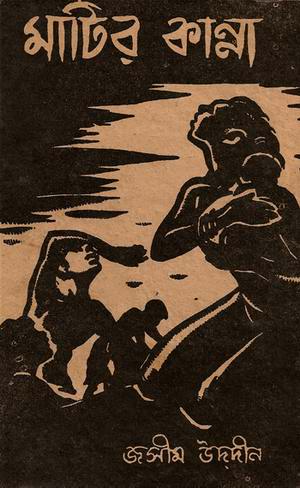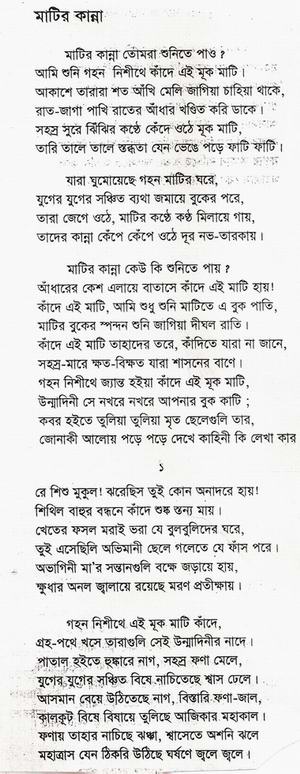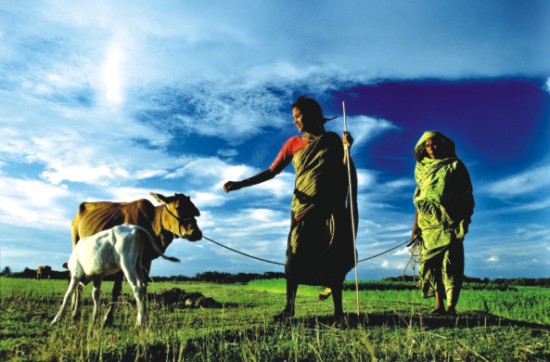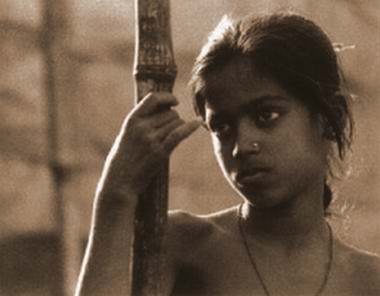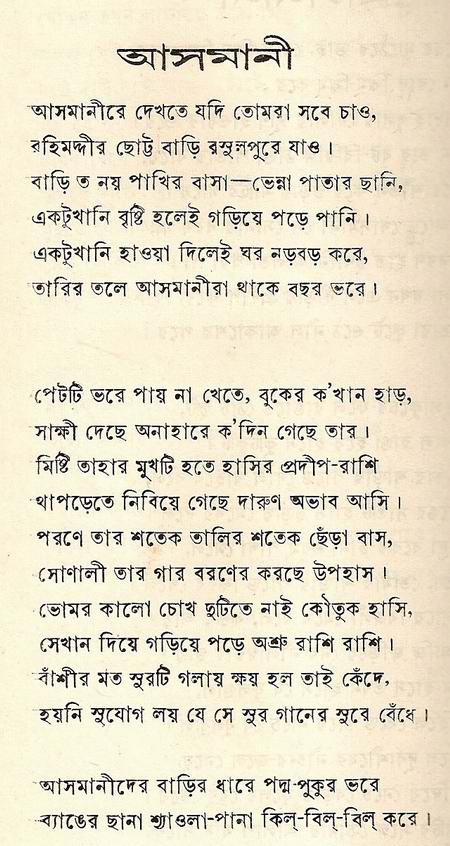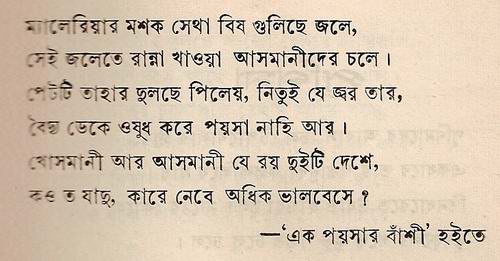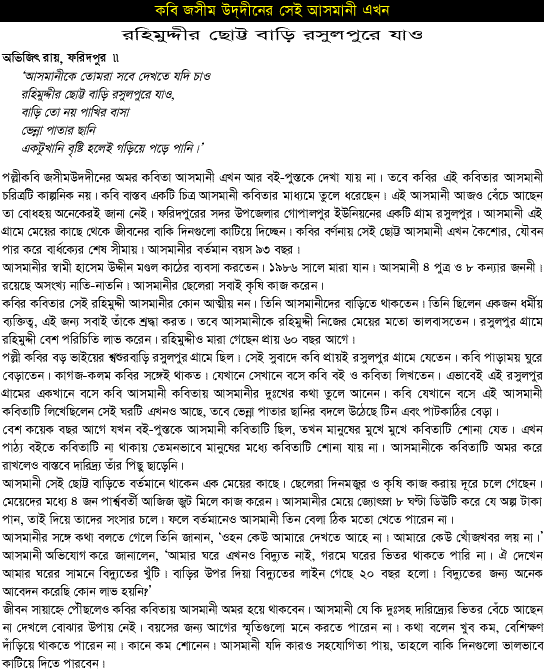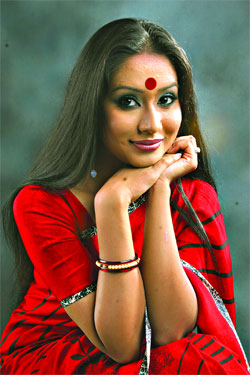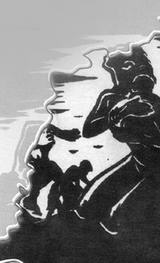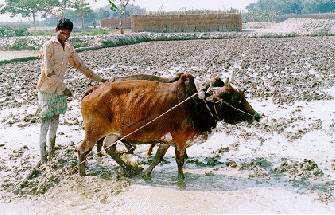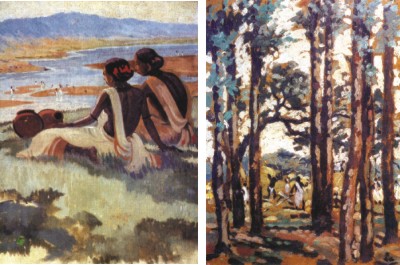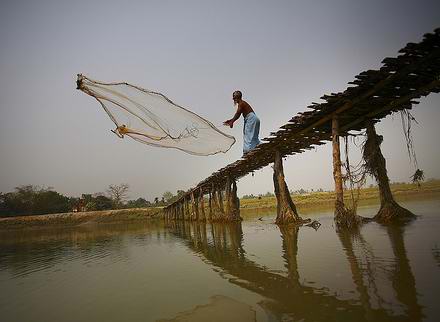The villagers of Bangladesh sing:
Snake Charmer / Babu Selam
Lyric and Music Jasim Uddin dance by Shibli & Nipa
O babu, many salams to you
my name is Goya the Snakecharmer,
My home is the Padma river.
We catch birds
we live on birds
There is no end to our happiness, For we trade,
With the jewel on the Cobra's head.
"We cook on one bank,
We eat at another
We have no homes,
The whole world is our home,
All men are our brothers
We look for them
In every door….."
(Jasim Uddin)- Translated by Hasna J. Moudud
1.2.1 Asmani
Field after field run along
Green winds sway tender paddy shoots
That spreads like open hair
In it butterflies ornamented with wings…
Mother earth smiles at her fertile pride.
In this harvest Asmanis (landless people) have no claim.
As worn out ribs hold together their stomachs
They burn with hunger.Forest after forest run along
This fairyland of flowers and fruits….
In this forest Asmanis (landless people) have no claim.
They are hungry.
River after river run along
They flow through nameless wharfs…
In this river the Asmanis (landless people) have no claim.
Worn out ribs hold together their stomachs
They are empty.
Translated by Hasna J. Moudud
ASMANI
Jasim UddinIf you want to see Asmani*
Translated by Hasna Jasimuddin Moudud
Go to Rahimuddin's small house in Rasulpur.
It is not a house, a bird's nest made with 'venna' leaves
The slightest rain pours water inside.
The slightest wind, rocks the house
Under its roof Asmanis' live all year long.
She doesn't have a full stomach
The ribs in her cage are witness to her starving days.
The bright smile has gone from her sweet face
wiped out by cruel poverty.
She wears one hundred stiches on a hundred holes in her dress
Making a mockery of her golden skin.
The bee black eyes do not have twinkle of laughter
Only tears pour down in deluge.
Her flute like voice is wasted by crying out
She never had a chance to sing to tune of music.
Near Asmani's home lies the lotus pond
Where tadpoles and moss cover the water.
Mosquitos breed poisonous seeds of malaria germs
In its water the Asmanis carry on cooking and drinking.
Her stomach swells with worms, fever accompanies daily
They have no money to call for a doctor.
Khosmani* and Asmanis live in two lands
Tell me my jadu* who will you accept with greater love.
From Ek Poiser Bashi (Flute for a paisa)
* Venna is a local leafy plant that provides cover of a poor hut
* Khosmani means, the happy one and Asmani means sky.
*Jadu is an affectionate name for a young one, literally meaning magic.
From Daily Janokantho, July18, 2008.
Jasimuddins Asmani released
Asmanider dekhte jadi tomara sabe chao Rahimuddir chhotao barhi Rasulpure jao.
If you want to see Asmani, you can go to Rahimuddi’s house in Rasulpur – wrote Pallikabi Jasimuddin in his famous poem on Asmani, a poverty-ridden rural girl in Rasulpur.
Asmani is still alive and now 110 year old. A music company called Sweet Song Products released a music album titled ‘Asmani’ sung by Shamim Afroj Shima at Shaukat Osman Auditorium of Central Public Library on Monday.
The organisers arranged the programme to provide financial help to Asmani, the protagonist of the Pallikabi’s poem of the same title. Managing director of the music company Ridwana Afrin Sumi in her address of welcome said that they want to help Asmani of Jasimuddin’s poem who is still languishing in poverty. ‘We want to help her by giving a part of the sale money from the music album,’ she added.
Former secretary Syed Marghub Murshed was present as chief guest while Mohammad Shamsul Huda, senior vice-president (sales and marketing) of satellite television channel ATN; Mohammad Saidul Haque, executive director of Human Rights Review Society; Selim H Rahman, managing director of Hatil Complex Limited; Nargis Banu, director of Prashika and Imtiaj Mahmud Bhuiyan, chairman of Intellect Trade Link were present as special guests.
Rezaul Karim, managing director of Organic Health Care Limited presided over the function. The speakers appreciated the initiatives of the music company in helping Asmani. They said that sufferings of this elderly rural woman were passionately described in the poem by Jasimuddin. The readers of this poem still feel for her but many do not know of her present situation.‘The music company has rediscovered the lady and presented her through the songs in front of the whole nation,’ they added.
Music director Lokman Hakim conducted the programme, followed by a solo performance by the singer.Shima started the soiree singing Asmani, the title song of the album (July 13, 2008).1.2.2 Cloud
Black Cloud, come down, come down
lower-bearing Cloud, come down, come;
Cloud like cotton, Cloud like dust,
O let your sweat pour down!
Blind Cloud, Blind Cloud, come,
Let your twelve Brother Cloudlets come,
Drop a little water that we
May eat good rice.
Straight Cloud, Strong Cloud, come,
Lazy Cloud, Little Cloud, come,
I will sell the jewel in my nose and buy
An umbrella for your head!
Soft Rain, gently fall,
In the house the plough neglected lies,
In the burning sun the farmer dies,
O Rain with laughing-face, come!'
Allah Megh De-S D Burman
Hema Malini - Allah megh de
(Source: Selected Poems of Jasim Uddin, Nakshi Kathar Math)
1.2.3 You've set me adrift
Bhatiyali songs
One of the most famous and extremely popular bhatiyali songs is from the collection of the renowned poet and the folk music exponent Jasim Uddin (1904-76). Few Bengali poets have loved the villages of Bengal more and few have expressed in poems and songs the simple joys and sorrows of the villagers more poignantly and feelingly
amay bhasaili rey
amay dubaili rey
akul dariyar bujhi kul nairey
kul nai kinar nai naiko nadir padi
tumi sabdhanetey chalaiyo majhi
amar bhang tari rey
(You've set me adrift
You've sunk me
The endless waters have no shore
Limitless, with no shores, the waters have no banks
O row with care boatman, my riven boat.)1.2.4 Come to Garden by Night
One of the most popular songs of Jasim Uddin "Come to Garden by Night" sung by famous Shachin Dev Barman (To immortalise the name of Shachin Dev Barman West Bengal govt did a lot of things and named some memorials after his name. Recently, a centenary was celebrated on him with great pomp and grandeur)in different indian languages and sung by millions in the sky and air of indian sub-continent:
"Come to Garden by Night"
Nishte Jaio Phul bane, O Bhomora
Come to the garden by night.
My bee.
I shal stay up the night
Lighting the lamp of moon
And talking to the dew drops
My bee.
Come to the garden by night
should I fall asleep
Tread softly my bee,
Do not break the branch
Or crush my flowers.
Or awaken the flower that is asleep
Come to the garden by night.
My bee.
Translated by: Hasna Jasim Uddin Moudud
(Word and music by Jasim Uddin, Sung by Shachin Dev Barmon , record available at Calcutta (Kolkata)
In Bangladesh in 1972, about 5 crore people were used to live under poverty line. But the figure rose to 7 crore in the year 2005.
"Yes, India is progressing well with agriculture but, growingly, farmers have been committing suicide in large numbers", Chenglala Reddy, Chairman, Federation of Farmers' Association, Andhra Pradesh. India (2005)
Rabindranath Tagore suggested to end poverty and privation as a matter of right of the poor. He emphasises on man to capacitate himself from within. Kindness and charity can not much change human condition. "Man will never accept any real benefit as a dole or as a debt. He accepts it only if he merits it." ("Lokehit" in Tagore's Collected Works, Joy Books International, Dhaka Vol. XII p. 148). To deserve what is due to them, they must be united. They should attain universal literacy. The change should be in the mind. Instead of petti fogging, they should have the inner capacity to quest for something big. That makes a nation great.
He continues, "The sign of a prospering nation is that every department, every individual turns away from the pettiness. Every one is earning the right to human dignity. Man in that nation thinks on how everyone as individual can live a decent life, earn a quality education, have adequate food, clothing, medicare, and leisure" . The poor should be organised to realise equity oriented society and economy. The job of igniting their potentials should begin from within our tradition, our success should be our investment
Publications on Bangladesh by the World Bank and other agencies and organizations always say: "Bangladesh is one of the poorest countries in the world." But it is not true. PPP adjusted GDP for Bangladesh is $299.9 billion (estimated). World Factbook ranked 232 countries on PPP adjusted GDP where Bangladesh ranks 34th. Again, Bangladesh GDP in official exchange rate is $64.8 billion and it ranks 57th out of 232 countries. Either by PPP adjusted GDP or by official exchange rate GDP it is not justifiable to classify Bangladesh as one of the poorest countries in the world.
It is an efficient economic engine though it is beset with 1) corruption, 2) political mismanagement, and 3) misaligned economic emphases. In spite of the rosy pictures , 82 percent of the people live on less than $2 a day. It cannot be denied that more than 80 percent of the people live in poverty. Ten percent of the population enjoys the quality of life of countries having per capita income of more than $40,000. 80 percent live with income less than $600 a year.
The failure of the economy to bring the benefit to the poor is due to inefficient and ineffective government and incongruent external influence
1.2.5 O Father Come Let Us Plough
O bajan Chal jai mathe langol baite.. Music and Lyrics by Jasim Uddin "O Bajan Chal Jai Chal mathe Langol baite
O father come let us go
To the field to plough
Place the ploughs on oxen shoulders and
Push, push, push.
We who bring out food
From the depth of the earth
We who provide food for the whole world
Why can't we eat can any one tell us?
My wife has hanged herself
She could no longer bear hunger,
Now I plough deep into soil
In the hope of seeing her again.
We plough the fields
Our bosom is always flayed
But from the fields we get harvest
None from the sacrred bosom. We shall plough no more for rice But to see how far it is to graves.
Translated by: Hasna Jasimuddin Moudud
(Word and music by Jasim Uddin, Sung by Abbasuddin, record available at Calcutta (Kolkata))1.2.6 Jasim Uddin's dance drama Kabor
Melancholy highlighted in rhythms -Tonatuni stages Jasim Uddin's dance drama Kabor
On the third day of the Tonatuni Festival, Tonatuni staged a dance drama Kabor adapted from the popular poem Kabor by Pallikobi Jasim Uddin. The dance drama starts with the effect of the dawn when the last lines of the Fazr Azan is heard. A very old grandfather comes on stage in feeble steps and starts telling his story to his grandson. The unhappy grandfather tells him about the five deaths in his family. He also recollects the memories of his getting married, the little bride's doll playing, the fair they attended, the bride's bathing with her friends and other insignificant yet happy moments of his life. Directed by dancer Dipa Khondokar with light directions by famous light director of Kolkata Tapash Sen, the total performance was excellent.
Earlier in the programme Tapash Sen, who is known as 'The Magician of Lights', was awarded a medal by the chief guest Minister for Cultural Affairs Selima Rahman. A CD of Jasim Uddin's Nimantran, sung by Kiron Chandra Roy, was also launched by the wife of Pallikobi, Begum Mamataz Jasim Uddin. To the delight of the audience, Kiron Chandra Roy sang the title song of the CD Nimantran.
In a discussion session, Selima Rahman, Shamsuzzaman Khan, Kamal Lohani and the Managing Director of Tonatuni, Mahbubur Rahman Jaynal spoke about Jasim Uddin and the Tonatuni Festival.
The Tonatuni Awards 2003 were handed over to Momtaj Jasim Uddin, Soumitra Chatterjee, Sandeep Ray, Mamota Shankar, Babita, Haradhan Banerjee, Shova Sen, Madhuri Mukherjee, Tapan Chatterjee, Baishakhi Ghosh, Kaderi Kibria, Ishita, Orin Haque, Shanta, Maria Promi and Tushar.
Tonatuni Festival 2003 exhibits valuables of two legends of the subcontinent--Satyajit Ray and poet Jasim Uddin.With the ongoing cultural festival organised by Tonatuni, the National Museum has become an eventful rendezvous for visitors interested in Stayajit Ray and Jasim Uddin. An unprecedented exhibit of valuables, photographs and other interesting items of the two personalities has attracted hundreds of visitors. Simultaneously, films of Satyajit Ray are being screened at the museum's auditorium. The exhibition is being held at the Lalitakanta Bhattashali hall of the museum. The most attractive part of the exhibition is surely the collection of costumes used in Satyajit Ray's films. The collection displays mainly panjabis from films like Ashani Sanket, Pather Panchali, Apur Sansar, Tinkanya, Satranj ki Khilari, and Sonar Kella and Joy Baba Felunath of the most famous amateur detective in Bangla literature--Felu'da. Besides, there are the panjabis worn by the King of Halla and renowned actor Victor Banerjee in the Goopy-Bagha films and Piku. What makes one wonder about the costumes is their artistic embellishment and grandeur. The exhibition also consists panjabis displaying several of Satyajit Ray's illustrations from his famous Kheror Khata (the Scrap Book) being embroidered on them. A panjabi shows the illustrious advancement of the genius of Satyajit Ray from Pather Panchali to his win of the Oscar award.
Poet Jasim Uddin's photographs show some eventful moments in the poet's life, his family members, and other acquaintances.
With the ongoing cultural festival organised by Tonatuni, the National Museum has become an eventful rendezvous for visitors interested in Stayajit Ray and Jasim Uddin. (Daily Star Sept. 13, 2003).Exquisite -From stage to celluloid
The ongoing Tonatuni Festival is holding an exhibition of photographs taken by Shakoor Majid that project a brief scenario of theatrical activities on stages in Dhaka. Entitled Rhythm on the Stage, the exhibit presents still pictures from selected 50 stage plays. On the occasion, an album was also launched in the evening of September 13 at the National Museum auditorium. Bijoya Ray, wife of Satyajit Ray, and Begum Mamtaz Jasim Uddin, wife of Pollikobi Jasim Uddin, inaugurated the exhibition. Shakoor Majid's photos generally depict some stories associated with his subjects--moments, people and objects. Shakoor selects 'mute, intensive things and drab moments that in his treatment become evocative,' says Dhaka University's Professor Syed Manzoorul Islam. 'These objects and moments, in their ordinariness, have a story to tell.' And this time Shakoor comes up with stories of the stages in Dhaka.
1.2.7 Graves
Kabor in original bengali Original tide 'Kabar', first published in 1929 in Rakhali (Pastoral Poems),was as a text for the Matriculation Examination of Calcutta University while Jasim Uddin was still a student of I. A. class.
"I was surprised when in 1929 I read Jasimuddin's poem "Kabar" in Calcutta University’s selection of Bengali texts for the Matriculation examination. A poem by a Muslim writer in the Matriculation selections! And that too under the auspices of the University of Calcutta? . . . A teacher of mine told me a story about this. There was forceful opposition in [the University's] Syndicate to the inclusion of by a student. But Dr Dinesh Sen was the number one advocate for Jasimuddin. . . . Apparently, he countered the opposition by saying, "All right, please be patient and just listen to me recite the poem." He had a passionate voice and could recite poetry well. He read the poem with such wonderful effect that the eyes of many members of the Syndicate were glistening with tears." (Wahidul Alam, "Kabi Jasimuddin," Alakta, 5 no. 2 [1983]; quoted in Titash Chaudhuri, Jasimuddin: Kabita, gadya o smriti [Dhaka, 1993], p. 172).
Here, under the pomegranate tree, is your grandmother's grave;
For thirty years my tears have kept it green.
She was a little doll-faced girl when she came to my horne,
And she wept to be done with the play ofher childhood days.
Returned from my travelling onee,
I suddenly knew She had been in my thoughts all the time.
Like the dawn her golden face would blind my eyes,
And from that day I lost myselfamong smallj oys of hers.
There along that path I'd take the plough to the fields
And, leaving, would turn
For a last look at her to take with me.
How she'd smile, my long-wed sister-in-Iaw, because of this!
When she went to her father's house she said, touching my feet,
'Do not forget to visit me soon at the village of 'Ujan-toli.'
So when I sold melons at market I saved a few coins
And bought her a neeklace ofbeads, tobaceo and toothpowder.
(And what's sofunny in that, my lad?)
How happy your grandmother was when she got these small gifts;
If only you could have seen her fingering her nose-ring.
She said, 'Y ou have come after so many days;
I have beeil waiting in tears,
Watehing the path for you,' smiling now.
When we parted for a mere few days you couldll't console her;
I wo nd er how she sleeps in her grave in this lonely place?
Fold your hands, grandson, and pray:
'Corne, oh merciful God,
Let Paradise descertd for my grandmother.'
Empty the life I endured when she left me;
Yet it seems each one I embraced here has gone,
Following her to that distant land.
A hundred graves are carved on the stone ofmy heart;
I get con~used counting the number, computing it over and over
again.
These wrinkled hands that hold the spade
Have buried so many beloved faces under hard earth
That I have come to love it, press it to my heart.
Come, kneel and pray, grandson;
Perhaps tears will relieve this pain.
Here sleeps your father, and here your mother sleeps:
Still your tears, while I tell you their story.
One April morning my boy called out,
'Father, I cannot go to the fields today.'
I spread out a mat on the floor for hirn, said 'Sleep, my Son.'
How could I know that this would be his last slumber?
A clean coffin I made hirn, and as I carried him here
'Where are you taking my father?' you followed crying.
I could not answer, my little son,
All the words in the world turned away grieving.
Night and day your mother's tears were unceasing,
Clasping your father's yoke and plough in both hands.
For sorrow the leaves fell from the forest trees,
The winds of April wailed in the empty rice-fields;
And villagers passing along that path wiped their cyes.
Even the leaves they trod underfoot crumpled and died.
From their stall the two bullocks regarded the unploughed fields
While your mother clung to their necks with heart-broken sobs
Till it seemed the whole village would drown
In oceans ofher weeping.
Perhaps the tears of that lovely girl
Found a path to the land of the dead.
In the morning ofher life she longed for evening;
Ah, poor girl, she wove her own shroud with her hands.
Before her death she summoned you to her:
My child, she said, my greatest pain is
Leaving you motherless in this world,
My darling, my jewel, my son.
What blessings she gave you!
Then to me, 'Over my grave hang my husband's wide wicker
sun-hat;
It will swing in the wind.'
Long ago that hat fell and mixed with the dust.
But the pain in my heart still cries out
For these two that sleep in the shade.
How lovingly the tree-boughs bend above;
The firc-fly maidens of evening light lamps
And the crickcts make music with small beIls tinkling.
Fold your hands, grandson and pray: '0 come, eternal God,
Let Paradise des ce nd now for father and mother.'
Here is that fair little maiden, your sistcr's grave.
We gavc her in marriage to a high-caste merchant's family;
They clid not love such a darling girl, thcy punished her,
Not with blows, but more cruelly, with words.
Message on message she sent me:
Grandfather, come tomorrow,
Take me to the land ofmy people For one or two days.
The heartless father-in-law let her come one winter at last;
Her face was pale, a smile no longer bloomed there
. Some days she passed by her parents' grave
Till cleath's flute called her away, and here I made her grave.
See how softly the grass and forest flowers caress her;
The wild doves sing her litany.
Fold your hands, grandson, and pray:
'Let Paradise descend for my unloved sister.'
Here lies my youngest child of seven years,
A brilliant rainbow bursting the gates ofParadise open.
Who knows what her thoughts were
Losing her mother so young?
When I looked in her face
Your grandmother came to my mind,
And I clasped her to me
"While tears washed the colour from the sky.
Returning from market one day
I found her stretched out in the dust
As if she had fallen asleep,
Hugging her doll, tired of play.
The black cobra that bit her
Had slithered away in the bush.
How bitter my tears were, laying my darling to bed in the grave.
Go soft, do not speak, little grandson, lest we wake her.
Slowly, dig slowly, slowly, let me see
How my heaven on earth lies sleeping
Under the black-baked bitter soil.
The warm-coloured sunset has kissed the fields
And great is my desire to hug the earth around me elose today.
The call to prayer floats from the mosque;
Let us fold our hands, little grandson, and pray:
'0 come, eternal God, let Paradise descend for our loved ones.'
1.2.8 The Field Of the Embroidered Quilt-
Villages1.2.8.1 Villages
A village here, village there,
And a broad field between-
A page to read all written over
With cropps and rice so green
This village beneath the tall trees
Plays at hide aand seek.
Here iand there the peasants' huts
Among the shadows peep.
That village lies closely bound together
By the blackended-eyelash gloom -
All-enfolding shade enhancing
The charm of the cottage home.This village looks to that,
And that one looks to this;
Who knows how many days will pass
Just like this?..........
1.2.8.2 Black
Black is the ink in my inkpot, from the pen with which I write
Black is the pupil of my eye with which I see the world
Oh Thou my dark Beloved, thou wilt not let me stay
a peace in my room.
A songA boy of this village has long dark curls
.....................
A dark and bee-black face
That glows as brightly as the flowers
And fresh as the young rice blades.
Black is the pupil of my eye,
Black the ink with which I write
Black is birth, and Death is Black
Black is the universal Night.
Black is the Son of the Soil and yet
Victor is he of All!
He who with gold
Has credit small.
................
Only give me the colours, Brother,
And I, even I,
Can make the garland of the rainbow,
Span the stormv sky !
Nor gold nor brass, nor face of gold
Brings universal joy,
But only the shining ebonv face
Of the smiling peasant boy.
Black is the paddy in his fields,
His village too is black;
In all this shadowy blackness shines
His body black.
In the fencing ring, his bamboo stick,
The highest honour claims;
Among the band of plavers, he
The chief of many names,
Among the singers, above all others
His voice rings high as a lark;
He is like the cane that useful proves
In many kinds of work.
The old folks sav, 'vou are not a boy,
you're made of hardest steel;
Did any worthier son than Rupa
Ta a father kneel?
His name is 'Silver' but precious is he
Beyond the price of silver.
The day will come when all this village
Will be famous from his name.1.2.8.3 Blind Cloud, Blind Cloud come
Blind Cloud, Blind Cloud come,
Drop a little water that we,
May eat good rice.
Black Cloud, black as eye-paint,
I will paint for you
A black spot on your brow
When we are married.
Straight Cloud, Strong Cloud come,
Lazy Cloud, Little Cloud, Come,
I will sell the jewel in my nose and buy
An umbrella for your head !
Vermilion Cloud, I will give you
A casket of vermilion
To adon your body in exchange for lightning
That the fields may be flooded.
Soft Rain, gently fall,
In the house the plough neglected lies,
In the buming sun the farmer dies,
O Rain with laughing face, come!
Calling thus on the twelve clouds' names,
They beg from house to house.
One gives a handful of rice,
Another gives much less
One gives some salt, another dhal,
Another an anna throws;
Gathering thus from house to house,
The band of maidens goes.
.............
1.2.8.4 Love
Oh wherefore did I love?
With thoughts my days are hasting,
With tears my days are wasting;
She's not the paint that my brow adoms,
She's not the rice that fills my bams;
O wherefore did I love?
If I had known before
That love such anguish bringeth
I would have lived alone
A kodom tree beneath;
O wherefore did I love?
-A Song-
On countless clouds
His tunes are floating
And on the tune
A girl is sitting.
There sits the maiden
With dishevelled hair Stretching out her languid hands
That her flower-garland tear.
The flute continues playing
The evening light swings west,
Black night with black cloud dances In garlands of fireflies dressed.
The flute is playing folk-tunes,
And tun es to draw out pain,
From tune to tune it wanders
As through a distant plain.
Rupa's mind is dreaming,
Or he seems to see
The sad tune on a high cloud
Vanish airily.1.2.8.5 Embroidered Quilt
Spreading the embroidered quilt
She works the livelong night,
As if the quilt her poet were
Of her bereaved plight.
Many a joy and many a sorrow
Is written on its breast;
The story of Rupa's life is there,
Line by line expressed.
She is a daughter beloved at home
When the embroidery begins;
Later a husband sits at her side;
Her red lips hum as she sings.
The self-same quit today she opens,
But those days ne'er return;
Those golden dreams of joy have vanished,
To ashes grey they burn.
Stitch by stitch she carefully draws
The last scene of pain,
The farewell of Rupa, slowly going,
Then truning a littles again,
At the door his peasant wife
Standing dishevelled, gazing at him,
Who is going to leave her for life.
She wept upon the careful stitches,
That last scene shown so weil.
Her face turned pale as ashes
Down in the quilt she fell.
In this way many days have passed,
Carrying unberable pain;
At last came the tempest that smote the trees;
Her body broke with strain...
(Shaju tells her mother)
Wipe your eyes and listen to me mother),
On the floor my quilt outspread,
Propped on pillows, let me hold once more
The needle and the thread.
The pale hand take the needle,
And stitch by stitch she works;
Contemplating the design completed,
Wiping the tear that lurks.
She has drawn her tomb upon the quilt,
A shepherd stands beside;
Dark night there sits like one bereaved
From the grave a little aside,
Playing a flute,. while the ceaseless tears,
Are falling from his eyes.
She draws according to her fancy,
She looks and looking cries.
Weary and calling her mother, she says,
This quilt on my grave shall be spread;
The morning dew will weep on its breast
When I am dead.
And here if he ever returns again
His tears may break the sleep of death,
I may rise at night from the ground,
How will he bear this pain, mother,
On this quilt lies all of mine;
All my pain and ·all my grief,
Emroidered line by line.
So lay it on my grave, mother,
This picture of my grief,
That his and mine upon its breast,
May mingling find relief.
From Field of the Embroidered Quilt by Jasim Uddin
1.2.8.6 Nimontron
Kobi Jashim uddin
Invitation
Poet Jashim uddin
Tumi jabey bhai - jabe more shathey aamader chhoto gnaey
Gachher chhayaey lotaey pataey udashi boner baey ;
Dear friend, will you come with me to our small village,
Under the shade of the trees
, Among the twining tendrils and leaves,
Where the wild breeze blows.
Tumi jodi jao - dekhibey shekhaney mator-lotar shoney,
Sheem - aar sheem - hath baralei muthi bhorey shei khoney
If you will come, you will see,
Entangled in slender twining, lots of green peas,
So many that hands get full sooner than you reach.
Tumi jodi jao sheshob kuRaey
NaRar aaguney poRaey poRaey
If you will come, we will gather those,
And roast them in the fire of paddy-hay,
Khabo aar joto gneyo chashider dakia nimontroney
Hasia hashia muthi muthi taha bilaibo joney joney
We will eat and invite all the village peasants
And smilingly give away handfuls to one and all.
Tumi jodi jao - shamuk kuRaey, khub - khub baRo korey
Emon ekti gathibo mala ja dekhnoni kaharo korey
If you will come, we will gather conch-shells,
And string them together in a long, long necklace
The kind you have never seen in anybody's hands.
Kareo debo na, tumi jodi chao
Moner khushitey diye debo tao
I will never give it to anybody, but if you will wish
I will present only to you, with all the joy of my heart.
Galaey poribey jhum jhum robey potherey mukhor korey
Hashibo khelibo gahibo nachibo sharati geram bhorey.
You will wear the necklace,
And reverberating our paths in a jhum jhum rhythm as we go,
We will laugh, play, sing, and dance all around the village.
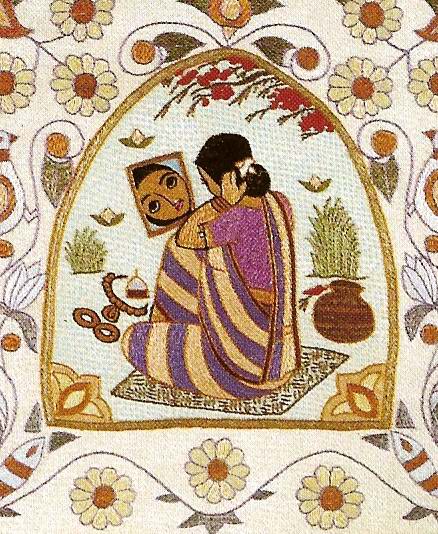
Last Modified:September 19, 2010
Home
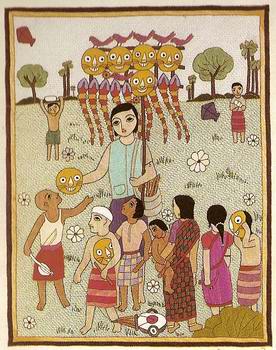


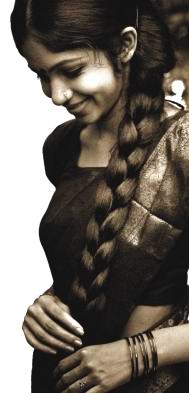 Jasimuddin's deep involvement in non-communal socio-political movements championing the cause of Bengali language and literature gives his lyric and folksy poetry a keen edge of commitment and protest. His poems are popular as part of school curricula in West Bengal, India as much as in Bangladesh.
Jasimuddin's deep involvement in non-communal socio-political movements championing the cause of Bengali language and literature gives his lyric and folksy poetry a keen edge of commitment and protest. His poems are popular as part of school curricula in West Bengal, India as much as in Bangladesh.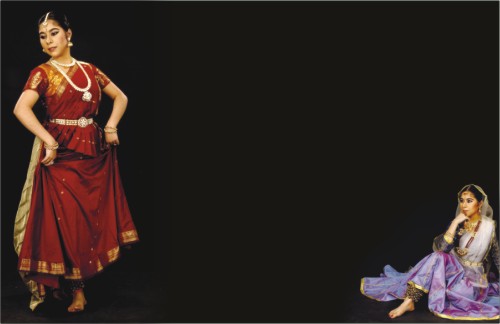
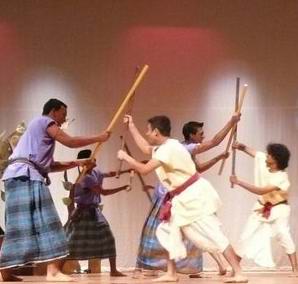
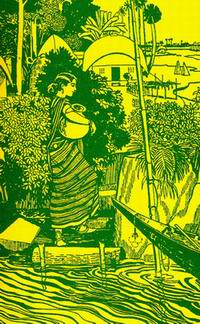 Jasim Uddin is proud of belonging to the folk tradition of Bengali literature. He was pleased by arecent comment of one critic who, praising his autobiography, said: 'Reading Jasim Uddin's Jiban Katha (autobiography) is like eating country cakes from mother's own hand.'
Jasim Uddin is proud of belonging to the folk tradition of Bengali literature. He was pleased by arecent comment of one critic who, praising his autobiography, said: 'Reading Jasim Uddin's Jiban Katha (autobiography) is like eating country cakes from mother's own hand.'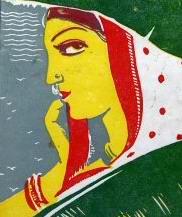 Gipsy Wharf and The Field, I think, are among Jasim Uddin's major work, but he is a versatile and prolific writer. Like another famous Bengali poet, Rabindranath Tagore, Jasim Uddin has tried his pen in almost every field. Boba Kahini (Tale of an illiterate man) 1964 . He has written many short dance dramas: Beder Meye 1951 (The Gipsy Girl), Madhumala 1956 (from the fairy tale of Princess Madhumala), Palli Badhu (Village Bride) 1956, the plot of which, he writes, is borrowed from Tagore. Jasim Uddin has also collected and rewritten numerous folk tales and folk music (Jari Gan, Murshida Gan He has published two volumes Bangalar Hashir Galpa (Laughing Tales of Bengal), vol. I, 1961, vol. 2, 1964.
Among Jasim Uddin's song books, perhaps the best are Rangila Nayer Majhi (Boatman of the Gay Boat) 1933 anel Padma Par (The Banks of the Padma River) 1949. Foremost of his lyrics are the books Rakhali (Pastoral Poems) 1929, Balu Char (The Sandbank) 1930, Dhan Khet (The Paddy Field) 1932. Other important lyrics written recently are in the books Rupavati 1946 and Sakhina 1960 (both girl's names). Thc first book of lyries published after the partition of India-Pakistan, when the poet moved permanently to Dacca, was the book.Matir Kanna (Sorrows of the Earth) 1955. This book has been translated into Russian.
Gipsy Wharf and The Field, I think, are among Jasim Uddin's major work, but he is a versatile and prolific writer. Like another famous Bengali poet, Rabindranath Tagore, Jasim Uddin has tried his pen in almost every field. Boba Kahini (Tale of an illiterate man) 1964 . He has written many short dance dramas: Beder Meye 1951 (The Gipsy Girl), Madhumala 1956 (from the fairy tale of Princess Madhumala), Palli Badhu (Village Bride) 1956, the plot of which, he writes, is borrowed from Tagore. Jasim Uddin has also collected and rewritten numerous folk tales and folk music (Jari Gan, Murshida Gan He has published two volumes Bangalar Hashir Galpa (Laughing Tales of Bengal), vol. I, 1961, vol. 2, 1964.
Among Jasim Uddin's song books, perhaps the best are Rangila Nayer Majhi (Boatman of the Gay Boat) 1933 anel Padma Par (The Banks of the Padma River) 1949. Foremost of his lyrics are the books Rakhali (Pastoral Poems) 1929, Balu Char (The Sandbank) 1930, Dhan Khet (The Paddy Field) 1932. Other important lyrics written recently are in the books Rupavati 1946 and Sakhina 1960 (both girl's names). Thc first book of lyries published after the partition of India-Pakistan, when the poet moved permanently to Dacca, was the book.Matir Kanna (Sorrows of the Earth) 1955. This book has been translated into Russian. 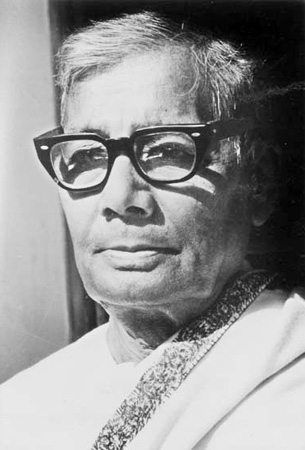 To embark upon translation is immediately to come face to face with a crisis of conscience. Either one intends to take the scholarly approach of being absolutely faithful to the text, 0r else one means to be faithful to the spirit of the work.
To embark upon translation is immediately to come face to face with a crisis of conscience. Either one intends to take the scholarly approach of being absolutely faithful to the text, 0r else one means to be faithful to the spirit of the work.